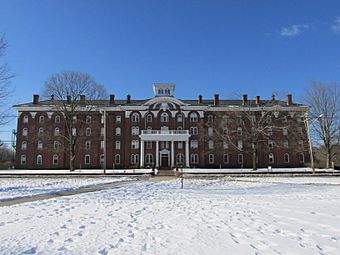Academy Historic District facts for kids
Quick facts for kids |
|
|
Academy Historic District
|
|

Rich Hall
Wilbraham and Monson Academy |
|
| Location | Wilbraham, Massachusetts |
|---|---|
| Architect | Multiple |
| Architectural style | Mid 19th Century Revival, Late Victorian |
| NRHP reference No. | 79000351 |
| Added to NRHP | April 20, 1979 |
The Academy Historic District is a special area in Wilbraham, Massachusetts. It's like a time capsule! This district covers about 65 acres. It includes the old center of Wilbraham town. It also has the historic part of the Wilbraham & Monson Academy campus. You can find it along Mountain Road, Main Street, and Faculty Street.
The Wilbraham & Monson Academy is a very old school. It started as Wesleyan Academy in 1817. It moved to Wilbraham in 1824. Some of its oldest buildings are from 1825. Later, it joined with Monson Academy. This created the school we know today. The academy was very important for Methodist teaching in New England. It helped the town of Wilbraham grow a lot.
Contents
Historic Buildings of the Academy
The Academy Historic District has several important buildings. Many of these are part of the Wilbraham & Monson Academy. They show different styles of architecture from the past.
The Old Academy Building
The main historic building is called the Old Academy. It was built in 1825. Enoch Mudge designed this large brick building. It has two stories and a slate roof. A white belltower sits on top.
Fisk Hall
Next to the Old Academy is Fisk Hall. This building was finished in 1851. It also has two stories and is made of brick. It features sandstone trim. A small dome, called a cupola, tops the building.
Binney Hall
Binney Hall was built a few years later, in 1854. It is also a two-story brick building. Its design is similar to other academy buildings from that time.
Smith Hall Gymnasium
The Smith Hall Gymnasium was built in 1896. It has interesting details from the Richardsonian Romanesque style. This style often uses heavy stone and round arches. The gymnasium has a hipped slate roof.
Alumni Memorial Chapel
The Alumni Memorial Chapel stands next to the gymnasium. It was built in 1867. This chapel is made of red sandstone. It's a beautiful example of older church architecture.
Other Important Buildings
Besides the academy buildings, the district includes other historic places. These are civic buildings and homes. They show how people lived and worked in the past.
The Old Meetinghouse
The Old Meetinghouse was built in 1793. It was first used as a meeting hall for the town. Later, in 1835, it was changed into a home with two separate living spaces.
The Hearse House
Right next to the Old Meetinghouse is the Hearse House. This small building was used from 1890 to 1920. It stored the town's hearses. A hearse is a special vehicle used to carry a coffin.
Historic Homes
The district also has many homes. Most of these houses were built in the middle of the 19th century. They give us a glimpse into the daily lives of people from that time.
National Recognition
The Academy Historic District is very important. It was officially listed on the National Register of Historic Places in 1979. This means it's recognized as a significant historical area in the United States.



